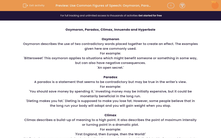.jpg)
Writers use many literary devices in their work. Sometimes this is to create sound or imagery and other times it is to provoke a response from the reader. In this activity, you will be looking at some complex devices that writers use.
They are oxymoron, paradox, climax, innuendo and hyperbole.
Have a look at these definitions and examples and get ready to answer the questions. Remember, you can also check back before you answer - it is allowed! Just click on the red help button on the screen.

Oxymoron
Oxymoron describes the use of two contradictory words placed together to create an effect. The examples given here are commonly used.
For example:
'Bittersweet' This oxymoron applies to situations which might benefit someone or something in some way, but can also have negative consequences.
'An open secret.'
Paradox
A paradox is a statement that seems to be contradictory but may be true in the writer's view.
For example:
'You should save money by spending it.' Investing money may be initially expensive, but it could be monetarily beneficial in the long run.
'Dieting makes you fat.' Dieting is supposed to make you lose fat. However, some people believe that in the long run your body will adapt and you will gain weight when you stop.
Climax
Climax describes a build-up of meaning to a high point. It also describes the point of maximum intensity or turning point in a dramatic plot.
For example:
'First England, then Europe, then the World!'
'At first, she was nervous and shy, but she then became alarmed and intimidated before reaching a state of complete terror.'
Anticlimax
Anticlimax describes the arrangement of ideas in descending order of importance. It is often used to provide humour.
For example:
'I fought for God, for country, and for my cat Tigger."

Innuendo
Innuendo is a subtle or indirect hint usually with negative connotations.
For example:
'Everybody passed the test - even me!' Here the author uses a tone of self-mockery.
Hyperbole
Hyperbole describes the use of exaggeration for emphasis.
For example:
'She cooked a mountain of food.' By using the word mountain to convey exaggeration, we understand that much more food was cooked than was needed.
'My love is deeper than the ocean.'
Happy with all that?

Let's get started then!







